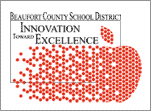Clients
Beaufort County (SC) School District
Beaufort, South Carolina | 19,000 students | 2,700 employees
Note: A detailed case study white paper for BCSD ("The Business of Learning: South Carolina School District Offers an Education in Superior Human Capital Management") is available for free download on our White Papers page.
The Need
 With
an intense focus on improving student achievement, the leadership of
the Beaufort County School District (BCSD) had come to the realization
that their system was "producing [only] the results it was designed
to produce." In order to generate different results - better
test scores and student achievement - the system itself would need
to be changed.
With
an intense focus on improving student achievement, the leadership of
the Beaufort County School District (BCSD) had come to the realization
that their system was "producing [only] the results it was designed
to produce." In order to generate different results - better
test scores and student achievement - the system itself would need
to be changed.
BCSD's people - its teachers, aides and support staff - were seen as the district's foundation and most important asset, and therefore represented the key vehicle for bringing about the systemic changes necessary for improved student results. Having already made significant investments in buildings and technology, it seemed clear that additional investments in those areas would not be able to produce the desired results.
To improve its understanding of the strengths and weaknesses in its people management and development system, BCSD chose to implement the HCC Scorecard for Education (now McBassi People Index®) for teachers and teachers aids in late 2002. The Scorecard has subsequently been implemented in 2004, 2005, and 2006. The results have been used over time with increasing sophistication to help BCSD to sharpen its focus on where to target improvements, and created a roadmap forward on how to better manage and develop their people in ways that have a observable impact on student achievement.
Findings
The results revealed a very strong predictive relationship between HCC's school-by-school measures of the quality of teachers' management and development and subsequent measures of student achievement (as measured by improvement in students' scores on standardized tests). This relationship is nearly twice as strong as the relationship between the socio-economic status and student test performance, and explains 53% of the variation in improvements in student achievement across BCSD's schools.
These findings have captured the attention of managers and decision-makers throughout BCSD because, although students' socio-economic status is outside of the influence of the schools, the quality of the management and development of teachers is not. Moreover, the gains in student achievement that result from focusing on the development and management of teachers are extremely large.
The Scorecard also revealed that BCSD's teachers and principals were quite sophisticated with regard to teaching to required state and other content standards, but that little additional gain in student achievement was likely to occur by becoming even more sophisticated in this regard. [The correlation between this factor and student test scores across schools was low and statistically insignificant.] Sandra Chavez, BCSD's director of organizational development, reports that the results "helped us to distinguish between those initiatives that will help us improve results and those that won't, and gave us a powerful new tool for improving student achievement."
The Results
Following its initial implementation of the HCC Scorecard in 2002, BCSD immediately used its findings to shape budget reallocations to more directly target specific areas for improvement. Hundreds of thousands of dollars that were originally intended to be spent on refining teachers' ability to implement content standards were instead reallocated to other interventions with potentially higher payoffs in student performance.
With each passing year, BCSD has become more sophisticated in using the findings from the HCC Scorecard to focus leaders' attention on those aspects of human capital management that will have the most profound effect on their "business result"-which is student achievement. School-level findings are used by the principals to determine their priorities, and district-wide findings are used to set priorities for the central office. Increasingly, the findings are being used to shape BCSD's leadership development investments, as well as for providing guidance and coaching to individual leaders.
Edna Crews, Superintendent, concluded, "One of the things that we do best is find creative innovative partners who work with us in our relentless pursuit of improved student achievement. McBassi & Company has proven to be a superb partner, providing us with jaw-dropping evidence on the impact that the work environment in our schools has on student learning. In a data-driven environment such as ours, the results they have produced for us have helped us in better identifying best practices within the district and in focusing our efforts on those initiatives that will improve student results."
Clients
Contact
Wondering how the McBassi People Index® will help your
organization?
Contact us today and we would be happy to discuss our services and answer any questions you have.
Phone: 866.345.5730
Email: info@mcbassi.com
